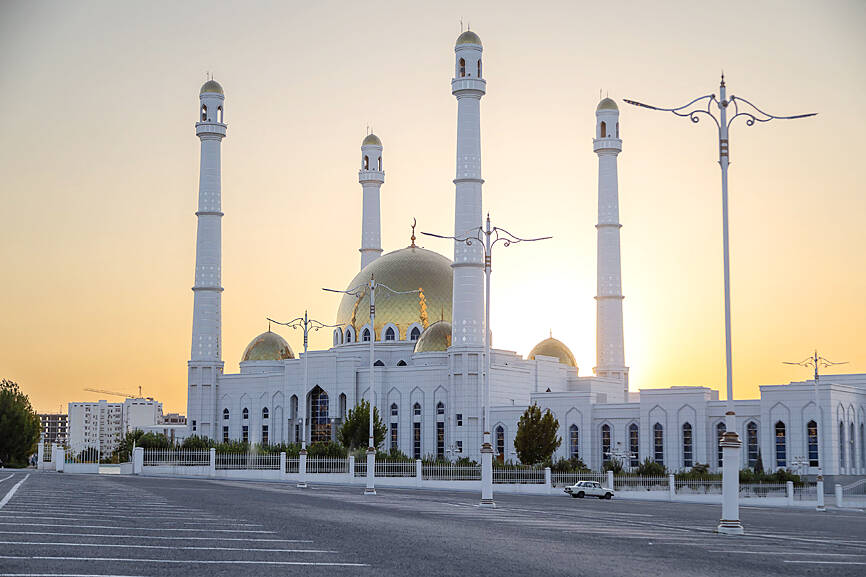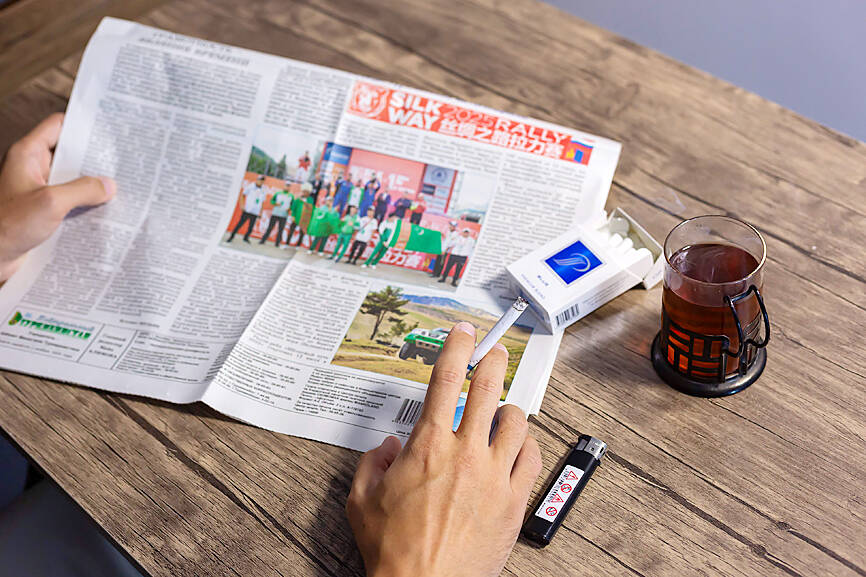When he was a teenager, Bekmurad Khodjayev used to hide from his parents to smoke. Fifty years later, the Turkmen pensioner is still hiding, but this time from the police.
“I smoke in my apartment, but if I feel like smoking in town, I find a place without surveillance cameras to avoid a fine — an alleyway, a dead end, behind some tall bushes or trees, a deserted spot,” the 64-year-old builder said.
The reclusive Central Asian state of 7 million people, where the rate of smoking is already very low, has vowed to eradicate the habit altogether by the end of the year.

Photo: AFP
Khodjayev said he had already been fined for smoking near his home.
“Since then, I try not to get caught anymore,” he said.
The target of going tobacco-free was set in 2022 by Turkmen President Gurbanguly Berdimuhamedov, a former dentist. Only 4 percent of Turkmens smoke, according to the WHO.

Photo: AFP Warning: Smoking can damage your health
There are heavy taxes and restrictions on cigarettes and smoking in almost all public places is now banned.
Khodjayev said he buys cigarettes at private kiosks since state shops run by the Turkmen Ministry of Commerce do not have them.
In his kiosk in the capital, Ashgabat, seller Meilis said the cigarettes came from Uzbekistan, Kazakhstan and Iran.
“Most of the time, I sell single ones. Not everyone can afford an entire pack, it’s too expensive,” the 21-year-old said.
STEEP FINES
Several smokers in Turkmenistan said a pack can cost between 50 and 170 manats (US$14.27 to US$48.52), while individual cigarettes cost between 2 and 4 manats.
A pack can set you back more than one-10th of the average monthly salary, which was about 1,500 manats in 2018, according to Turkmen government data.
Comparisons with other countries are complicated because of the double exchange rate in Turkmenistan — an official one controlled by the state and the real one, which operates on the black market.
In a hospital in Ashgabat, Soltan, a doctor, welcomed the government’s “active fight against tobacco.”
“We treat tobacco addiction. The health ministry has created centers where smokers can get free advice on quitting,” she said.
The authorities rely on more coercive methods with a variety of smoking bans, import restrictions and fines that can reach 200 manats.
“After receiving several fines, I decided to stop definitively after the time I got caught smoking in my car in a public car park,” said Ilyas Byashimov, a 24-year-old entrepreneur.
PUBLIC APOLOGIES
Gurbanguly Berdimuhamedov and his son, Turkmen President Serdar Berdimuhamedov, have ruled the country for almost 20 years with almost absolute power.
After Serdar Berdimuhamedov called in 2023 for a “no compromise” fight against smoking, about 20 people were shown on state television promising not to smoke water pipes or import tobacco illegally.
There are also regular public burnings of contraband cigarettes, accompanied by shows of traditional Turkmen dancing and singing.
With just a few months to go until the end of this year, the authorities are not claiming victory in rooting out smoking.
Connected for comment, the Turkmen Ministry of Health and Medical Industry declined to reply — not surprising in a country where obtaining and verifying any official information is extremely hard.
EFFECTIVENESS
Smokers seemed doubtful about a total ban.
“Cigarettes will not disappear completely, but will become much more expensive, and there will be a black market,” said Haidar Shikhiev, 60, a builder.
Seller Galina Soyunova said that cigarettes “will always be available under the counter but even more expensive.”
“Who will buy cigarettes for the price of gold? Nobody. The question of tobacco addiction will resolve itself,” she said.

In Italy’s storied gold-making hubs, jewelers are reworking their designs to trim gold content as they race to blunt the effect of record prices and appeal to shoppers watching their budgets. Gold prices hit a record high on Thursday, surging near US$5,600 an ounce, more than double a year ago as geopolitical concerns and jitters over trade pushed investors toward the safe-haven asset. The rally is putting undue pressure on small artisans as they face mounting demands from customers, including international brands, to produce cheaper items, from signature pieces to wedding rings, according to interviews with four independent jewelers in Italy’s main

Japanese Prime Minister Sanae Takaichi has talked up the benefits of a weaker yen in a campaign speech, adopting a tone at odds with her finance ministry, which has refused to rule out any options to counter excessive foreign exchange volatility. Takaichi later softened her stance, saying she did not have a preference for the yen’s direction. “People say the weak yen is bad right now, but for export industries, it’s a major opportunity,” Takaichi said on Saturday at a rally for Liberal Democratic Party candidate Daishiro Yamagiwa in Kanagawa Prefecture ahead of a snap election on Sunday. “Whether it’s selling food or

CONCERNS: Tech companies investing in AI businesses that purchase their products have raised questions among investors that they are artificially propping up demand Nvidia Corp chief executive officer Jensen Huang (黃仁勳) on Saturday said that the company would be participating in OpenAI’s latest funding round, describing it as potentially “the largest investment we’ve ever made.” “We will invest a great deal of money,” Huang told reporters while visiting Taipei. “I believe in OpenAI. The work that they do is incredible. They’re one of the most consequential companies of our time.” Huang did not say exactly how much Nvidia might contribute, but described the investment as “huge.” “Let Sam announce how much he’s going to raise — it’s for him to decide,” Huang said, referring to OpenAI

The global server market is expected to grow 12.8 percent annually this year, with artificial intelligence (AI) servers projected to account for 16.5 percent, driven by continued investment in AI infrastructure by major cloud service providers (CSPs), market researcher TrendForce Corp (集邦科技) said yesterday. Global AI server shipments this year are expected to increase 28 percent year-on-year to more than 2.7 million units, driven by sustained demand from CSPs and government sovereign cloud projects, TrendForce analyst Frank Kung (龔明德) told the Taipei Times. Demand for GPU-based AI servers, including Nvidia Corp’s GB and Vera Rubin rack systems, is expected to remain high,